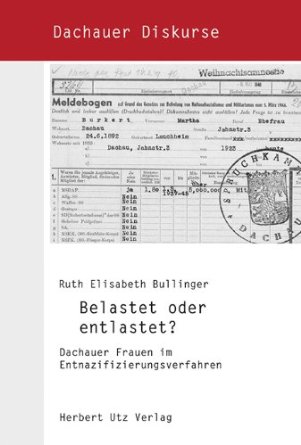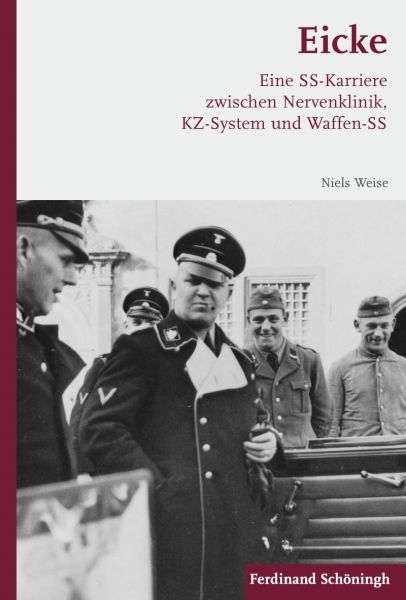|

|
Bullinger, Ruth Elisabeth : Belastet oder entlastet? Dachauer
Frauen im Entnazifizierungsverfahren. – Munich : Herbert Utz Verlag 2013
(Dachauer Diskurse
; vol. 7)
Answering the question of guilt and responsibility for Nazi crimes of
violence is no simpler even 70 years after the end of the Second World War. The
instruments developed by the occupying powers in the immediate postwar years
proved in many respects to be impracticable in bringing those responsible to
justice. The German offices entrusted with completing the de-Nazification
process from 1946 onwards were faced with the problem of calling individually
to account a too large a group of formally charged citizens. The inevitable
result was difficulties in the practical implementation on a local level.
Hence, the majority of the population, who viewed themselves to be victims of
the Nazi system and not its perpetrators, soon felt that the de-Nazification
program was unjust.
The
study by Ruth Bullinger examines de-Nazification in Dachau and focuses on to
what extent the concentration camp played a role in the proceedings against
women from Dachau. Since 1945 namely, Dachau’s citizens were for forced to put
up with claims that they were morally complicit for the crimes committed in the
concentration camp.
|
 |
Feingold,
Marko M. : Wer einmal gestorben ist, dem tut nichts mehr weh. Eine
Überlebensgeschichte. – Salzburg : Otto Müller Verlag 2012
The
memoirs of Marko Max Feingold are characterized by opposites and reveal a
number of twists and turns as well as disruptions in a life defined by National
Socialism and the Holocaust. Born in 1913 in Neusohl, today located in
Slovakia, he spent his childhood and youth in Vienna: a childhood in the Prater
followed by youthful years dancing in the Graben cafés, working as a sales
representative for a liquid soap manufacturer in Fascist Italy during the
1930s, a failed attempt to flee to Prague from the clutches of the Nazis, and
arrest in 1938 are the main stations of his early life. Marko Feingold survives
the inhumane horrors of the concentration camps Auschwitz, Neuengamme, Dachau,
and Buchenwald. After being liberated by the Allies Feingold ends up in Salzburg.
Here he heads an aid office for politically persecuted persons and over the
next few years he succeeds in supporting countless concentration camp prisoners
in their efforts to migrate to Palestine. A founding member of Salzburg’s
Israelite Community in 1946, he has headed the organization since 1977. His
unstinting engagement against forgetting history has contributed greatly to
public life beyond Salzburg. The narrative of this look back on his life is
never sentimental or accusing, and despite what he has suffered these memoirs
are full of humor and light-heartedness.
|
 |
Pfeil, Hugo
: Leben, Leiden und Sterben der kath. Priester im KZ Dachau. –edited and
annotated by Bernhard Haupert, Hans Günther Maas, and Franz Josef Schäfer. –
Eppelborn : Stiftung Kulturgut Gemeinde Eppelborn 2012
Hugo Pfeil was arrested by the Gestapo on September 20, 1939 for
“behavior hostile to the state”, accused of endangering the existence and
security of the nation and the state by spreading disquiet in the population
through inflammatory and corrosive speeches. A long ordeal followed, beginning
in the prisons of Ottweiler and St. Wendel and ten months in Sachsenhausen
concentration camp. From December 15, 1940 through to April 9, 1945 he was
imprisoned in the Dachau concentration camp.
Hugo
Pfeil wrote down his memoirs after the war. The editors have decided to use the
edition from 1960. Passages from the original version of 1946, not taken up in
1960, have been included in a commentary section. The full account of his period
of suffering in the Sachsenhausen and Dachau camps are thus now available to
the general public for the very first time, half a century after being written.
|
 |
Raim, Edith : Justiz zwischen
Diktatur und Demokratie. Wiederaufbau und Ahndung von NS-Verbrechen in
Westdeutschland 1945-1949. – Munich : Oldenbourg 2013
The notion of ubiquitous failure by the German
judiciary system is firmly entrenched. While not turning this on its head,
Edith Raim does qualify the conventional perspective in many respects. Her
starting point is the multifaceted social history of the West German judiciary
after 1945, whereby the vehement German-Allied discussions on Nazi “crimes
against humanity” are also taken into account. The main focus is given to
numerous German trials dealing with explosive issues such as the November 1938
pogroms, “Aryanization”, and “euthanasia”. The German judiciary authorities
were by no means inactive during the years of occupation. German society has
never again witnessed such intensive investigations. That the courts achieved a
great deal is barely recognized in the political discourse on Germany’s past.
Edith Raim has redressed this in an impressive study.
|
 |
Weise, Niels : Eicke. Eine SS-Karriere zwischen Nervenklinik, KZ-System und
Waffen-SS. – Paderborn: Ferdinand Schöningh 2013
Theodor
Eicke, an army paymaster in the First World War, became commandant of the
Dachau concentration camp and one of the most fanatical SS generals before being
killed on the Eastern Front in 1943. Niels Weise traces the career of this
notorious Nazi figure drawing in part on sources analyzed for the very first
time. This enables him to not only highlight the importance of Eicke in setting
up the concentration camp system and the armed SS, but also trace the
connections, motivated by phobias of civil war, between the Nazi movement and
rightwing terrorism at the end of the Weimar Republic. In 1933 Himmler
exploited Eicke’s situation: detained in a mental asylum by his opponents in a
political intrigue, Himmler obtained his release and thus reigned in the
wayward SS leader. The mental asylum proved to be the perfect tool for Himmler:
a SS career based on a strict upbringing, a sense of duty, and loyalty took its
fateful course. |